On this Day in History ... 5th February
05 Feb is in February.
1156 Henry II pays homage to Louis VII
1552 Trial and Execution of Edward Seymour Duke of Somerset and his Supporters
1661 Execution of Deceased Regicides
1668 Buckingham Shrewsbury Duel
1685 Death and Burial of Charles II
Events on the 5th February
On 05 Feb 1156 King Henry "Curtmantle" II of England (age 22) paid homage to Louis VII King Franks (age 36) for his lands in Normandy [Map], Anjou and Aquitaine.

On 05 Feb 1381 King Henry IV of England (age 13) and Mary Bohun (age 13) were married at Arundel Castle [Map]. She the daughter of Humphrey Bohun 7th Earl Hereford 6th Earl Essex 2nd Earl of Northampton and Joan Fitzalan Countess Essex, Hereford and Northampton (age 34). He the son of John of Gaunt 1st Duke Lancaster (age 40) and Blanche Plantagenet Duchess Lancaster. They were second cousins. He a grandson of King Edward III of England. She a great x 2 granddaughter of King Edward "Longshanks" I of England. 



On 04 Feb 1400 Bernard Brocas (age 46) was tried, and condemned to death, by Thomas Fitzalan 10th Earl of Surrey 12th Earl of Arundel (age 18) at Tower of London [Map] for his role in the Epiphany Rising having been captured in Cirencester, Gloucestershire [Map].
On 05 Feb 1400 Bernard Brocas (age 46) was beheaded at Tyburn [Map]. He was buried at the Chapel of St Edmund, Westminster Abbey [Map].
Letters and Papers 1535. 05 Feb 1535. Castelnau's Memoirs, i. 405. (Edit. Brussels, 1731.) 174. Palamedes Gontier to Admiral Chabot (age 43).
Was detained at Boulogne, as he wrote on Thursday night. Next day embarked at 4 a.m. Had a bad passage. The tide not serving to go up to Gravesend, went by Waterford (Canterbury?), and arrived on Sunday in London.
Passed the Thames near the house of Boidoval (Bridewell?), where he met Morette, who was very glad to see him, not daring to show himself to the King, who had spoken to him very sharply about the delay in Chabot's (age 43) answer. He sent to tell Norfolk and Cromwell of Gontier's arrival, and he was straightway conducted to Westminster to the King. After reading the Admiral's (age 43) letters and asking after his and the King's health, Henry drew him apart, and leaning on the sideboard heard what he had to say. Said that the Admiral (age 43) had not forgotten since his return to declare to Francis what Henry had charged him with, especially his entire good-will to preserve and increase the friendship and alliance between them, at which Francis was much rejoiced. As to the proposed marriage between the Princess (age 1) and Mons. d'Angoulesme (age 13), Francis doubts not that having given her that name, Henry will assure it to her and treat her as his only heiress, so that the Crown of England may come to her on his death. The Admiral (age 43) says that his king thinks some means ought to be found to deprive Lady Mary (age 18) of any occasion or means of claiming the Crown.

Here the King explained to him what had been done by Parliament since the Admiral's (age 43) departure; that the Princess (age 1) had been proclaimed and an oath taken throughout the kingdom; that everyone takes Mary (age 18) for the bastard she is, and he will have no other heir but the Princess, with whom, and in his power (en sa main), now is and will be the said Mary; there is no chance of her becoming queen or claiming any right to the Crown. He went on to say that it was only required for Francis to cause the Pope to annul the invalid dispensation given for the first marriage, and then all doubts would cease. Went on to the other points of his instruction. He is willing to give up the title of France, to take away all occasion of ancient enmities, and declared to Chabot the means to bring it to pass. Spoke about the 50,000 cr. for the pension for life, and 10,000 cr. of salt, saowing him how obliged the King and the kingdom would be if he were to give them up, without mentioning that that would be enough to break off the interview of the two Queens. Henry took this ill, saying that he had done so much for Francis, his children and his kingdom, that it is not fair to ask him to give this up, which he knows is unwillingly paid and odious; it is an honour to his kingdom to have them; it was a strange recompense when he offered the heiress of a kingdom to a younger son; they ought rather to give him something than ask; that it made him think there was a practise going on elsewhere, considering the delay in giving him an answer. Said to him that he ought to take this proposal differently, as it was founded on an overture he had himself made to the Admiral; he would put the French king under the greatest obligation to him, and it would be more to his glory and profit in the future than the payment. As to the perpetual pension, he did not object to what was proposed. He objected to the idea of being included if a treaty were made between Francis and the Emperor; there must be no hope of a treaty. The Emperor had already offered to accept what had been done in England, both the second marriage and other things, and even that the Princess should be heiress and Mary succeed in case of her death. With regard to the article excusing Francis from commencing war against the Emperor, unless he declares himself in aid of Piedmont, Savona or Genoa, on which side he will be very glad to begin the war on account of the quarrels which he has, Henry asked him when he wished to begin. Replied that he had the authority to hasten or delay, as he wished, for Francis would act according to the answer sent back by Gontier. Meanwhile he was not losing a single hour in putting his forces in readiness.
On 05 Feb 1550 William Brereton 1st Baron Brereton was born to William Brereton (age 30) and Jane Warburton (age 22).
Henry Machyn's Diary. 05 Feb 1552. ....[sir Michael Stanhope (age 45) was] cast of felony to be hangyd-the vj[th K. E. vjth.]
Wriothesley's Chronicle 1551. 05 Feb 1552. The 5 of February, Sir Myles Patriche, knight, was arraigned at Westminster and condempned for fellonie, and had judgment to be hanged.
Letters from Sir Robert Cecil to Sir George Carew Section 8 XVII. 05 Feb 1600. Court. To George Carew 1st Earl Totnes (age 44).
We have no news but that there is a misfortune befallen Mistris Fitton (age 21) for she is proved with child, and the E. of Pembroke (age 19) being examyned confesseth a ffact, but utterly renounceth all marriage. I fear they will both dwell in the Tower [Map] awhyle, for the Queen (age 66) have vowed to send them thether.

When you thing fit you may send over 1076 [Desmond] but retain his patent with yourself. You shall not need to send to know her Ma'ties further pleasure. In many wayes lett not Cashell come over. The more excpectation which 1076 leaveth behynd him o returne the better construction wilbe made of his departure.
Robert Cecil 1st Earl Salisbury (age 36).
On 05 Feb 1600 John Gordon 13th Earl Sutherland (age 24) and Agnes Elphinstone were married. The marriage was celebrated ovre two days at his lodgings Royal Mint aka Cunyiehous. King James VI of Scotland (age 33) and Queen Anne of Denmark (age 25) were house guests. As wedding gifts, James VI gave Agnes and Jean Elphinstone suites of gold and pearl accessories comprising, a necklace, a belt, and back and fore "garnishings" for their hair, which cost £1,333-6s-8d Scots. He the son of Alexander Gordon 12th Earl Sutherland.
On 05 Feb 1626 James Ley 1st Earl of Marlborough (age 74) was created 1st Earl Marlborough by King Charles I of England, Scotland and Ireland (age 25). Jane Boteler Countess Marlborough by marriage Countess Marlborough.
After 05 Feb 1638 John Bridgeman was buried at St Laurence's Church, Ludlow [Map]. The monument is most convincingly attributed to the workshop of the tomb maker Samuel Baldwin of Bristol although some source suggest Francesco Fanelli (age 48); the carving reflects the Italian-influenced innovations of London tombmakers: the figures have naturalistic features and there are skilfully carved drapery and garlands. The monument was commissioned by his wife Frances Daunt (age 60); Bridgeman's will entrusted her to create a monument as she thought fit.
Frances Daunt:
Around 1578 she was born to Henry Daunt of Owlpen, Gloucestershire.
Around 1595 John Bridgeman and she were married at Owlpen, Gloucestershire. The difference in their ages was 41 years. In Jan 1656 she died.
In Jan 1656 she died.
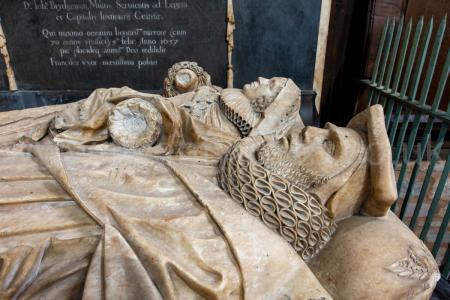
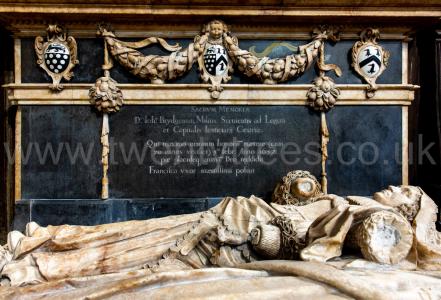
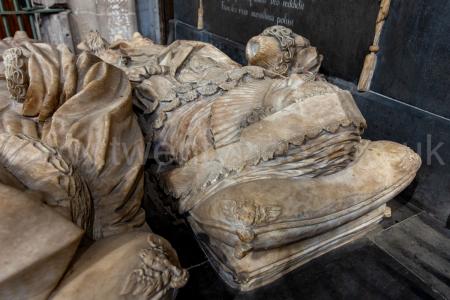
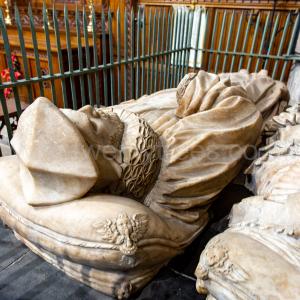
Pepy's Diary. 05 Feb 1661. Washing-day. My wife and I by water to Westminster. She to her mother's and I to Westminster Hall [Map], where I found a full term, and here I went to Will's, and there found Shaw and Ashwell and another Bragrave (who knew my mother wash-maid to my Lady Veere), who by cursing and swearing made me weary of his company and so I went away. Into the Hall and there saw my Lord Treasurer (who was sworn to-day at the Exchequer, with a great company of Lords and persons of honour to attend him) go up to the Treasury Offices, and take possession thereof; and also saw the heads of Cromwell, Bradshaw, and Ireton, set up upon the further end of the Hall. Then at Mrs. Michell's in the Hall met my wife and Shaw, and she and I and Captain Murford to the Dog [Map], and there I gave them some wine, and after some mirth and talk (Mr. Langley coming in afterwards) I went by coach to the play-house at the Theatre [Map], our coach in King Street breaking, and so took another. Here we saw Argalus and Parthenia, which I lately saw, but though pleasant for the dancing and singing, I do not find good for any wit or design therein. That done home by coach and to supper, being very hungry for want of dinner, and so to bed.
Pepy's Diary. 05 Feb 1668. Thence to other discourse, among others, he mightily commends my Lord Hinchingbroke's (age 20) match and Lady (age 23), though he buys her £10,000 dear, by the jointure and settlement his father (age 42) makes her; and says that the Duke of York (age 34) and Duchess of York (age 30) did come to see them in bed together, on their wedding-night, and how my Lord had fifty pieces of gold taken out of his pocket that night, after he was in bed. He tells me that an Act of Comprehension is likely to pass this Parliament, for admitting of all persuasions in religion to the public observation of their particular worship, but in certain places, and the persons therein concerned to be listed of this, or that Church; which, it is thought, will do them more hurt than good, and make them not own, their persuasion. He tells me that there is a pardon passed to the Duke of Buckingham (age 40), my Lord of Shrewsbury (age 45), and the rest, for the late duell and murder1 which he thinks a worse fault than any ill use my late Chancellor (age 58) ever put the Great Seal to, and will be so thought by the Parliament, for them to be pardoned without bringing them to any trial: and that my Lord Privy-Seal (age 62) therefore would not have it pass his hand, but made it go by immediate warrant; or at least they knew that he would not pass it, and so did direct it to go by immediate warrant, that it might not come to him. He tells me what a character my Lord Sandwich (age 42) hath sent over of Mr. Godolphin (age 33), as the worthiest man, and such a friend to him as he may be trusted in any thing relating to him in the world; as one whom, he says, he hath infallible assurances that he will remaine his friend which is very high, but indeed they say the gentleman is a fine man.






Note 1. The royal pardon was thus announced in the "Gazette" of February 24th, 1668: "This day his Majesty was pleased to declare at the Board, that whereas, in contemplation of the eminent services heretofore done to his Majesty by most of the persons who were engaged in the late duel, or rencounter, wherein William Jenkins was killed, he Both graciously pardon the said offence: nevertheless, He is resolved from henceforth that on no pretence whatsoever any pardon shall be hereafter granted to any person whatsoever for killing of any man, in any duel or rencounter, but that the course of law shall wholly take place in all such cases". The warrant for a pardon to George, Duke of Buckingham (age 40), is dated January 27th, 1668; and on the following day was issued, "Warrant for a grant to Francis, Earl of Shrewsbury (age 45), of pardon for killing William Jenkins, and for all duels, assaults, or batteries on George, Duke of Buckingham (age 40), Sir John Talbot, Sir Robert Holmes, or any other, whether indicted or not for the same, with restitution of lands, goods, &c". (Calendar of State Papers, 1667-68, pp. 192,193).
Pepy's Diary. 05 Feb 1669. Up betimes, by coach to Sir W. Coventry's (age 41), and with him by coach to White Hall, and there walked in the garden talking of several things, and by my visit to keep fresh my interest in him; and there he tells me how it hath been talked that he was to go one of the Commissioners to Ireland, which he was resolved never to do, unless directly commanded; for he told me that for to go thither, while the Chief Secretary of State was his professed enemy, was to undo himself; and, therefore, it were better for him to venture being unhappy here, than to go further off, to be undone by some obscure instructions, or whatever other way of mischief his enemies should cut out for him. He mighty kind to me, and so parted, and thence home, calling in two or three places-among others, Dancre's (age 44), where I find him beginning of a piece for me, of Greenwich, Kent [Map], which will please me well, and so home to dinner, and very busy all the afternoon, and so at night home to supper, and to bed.
Evelyn's Diary. 05 Feb 1684. It began to thaw, but froze againe. My coach crossed from Lambeth [Map] to the Horseferry at Millbank, Westminster. The booths were almost all taken downe, but there was first a Map or Landskip cut in copper representing all the manner of the camp, and the several actions, sports, and pastimes thereon, in memory of so signal a frost.
Evelyn's Diary. 04 Feb 1685. I went to London, hearing his Ma* (age 54) had ben the Monday before (02 Feb 1685) surpriz'd in his bed-chamber with an apoplectic fit, so that if, by God's providence, Dr. King (that excellent chirurgeon as well as physitian) had not ben accidentally present to let him blood (having his lancet in his pocket) his Ma* had certainly died that moment, which might have ben of direful consequence, there being nobody else present with the King (age 54) save this Doctor and one more, as I am assur'd. It was a mark of the extraordinary dexterity, resolution, and presence of mind in the Dr, to let him bloud in the very paroxysm, without staying the coming of other physitians, which regularly should have ben don, and for want of which he must have a regular pardon, as they tell me *. This rescu'd his Ma* for the instant, but it was only a short reprieve. He still complain'd, and was relapsing, often fainting, with sometimes epileptic symptoms, till Wednesday, for which he was cupp'd, let bloud in both jugulars, had both vomit and purges, which so rellev'd him that on Thursday hopes of recovery were signified in the publiq Gazette, but that day, about noone, the physitians thought him feaverish. This they seem'd glad of, as being more easily allay'd and methodically dealt with than his former fits; so as they prescrib'd the famous Jesuits powder: but it made him worse, and some very able Doctors who were present did not think it a fever, but the effect of his frequent bleeding and other sharp operations us'd by them about his head, so that probably the powder might stop the circulation, and renew his former fits, which now made him very weake. Thus he pass'd Thursday night with greate difficulty, when complaining of a paine in his side, they drew 12 ounces more of bloud from him; this was by 6 in the morning on Friday, and it gave him reliefe, but it did not continue, for being now in much paine, and strugling for breath, he lay dozing, and after some conflicts, the physitians despairing of him, he gave up the ghost at halfe an houre after eleven in the morning, being the sixth of February 1685, in the 36th yeare of his reigne, and 54th of his age.
On 05 Feb 1685 King Charles II of England Scotland and Ireland (age 54) was received into the Catholic Church in the presence of John Huddlestone (age 76).
Minutes of the Society of Antiquaries. 05 Feb 1718. It ws proposed for the first time by Mr President Norroy (age 57) to engrave a drawing of Richard II's picture in Westminster Abbey taken by Mr Talmans (age 40) direction agreed to.
Mr George Holmes (age 56) is to do [?] to keep the books belonging to the Society till further order.
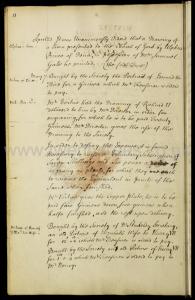
After 05 Feb 1757. Church of St Andrew, Wickmere [Map]. Graves slabs to Horatio Walpole 1st Baron Walpole (deceased) and William Walpole (age 1).
William Walpole: Around 1756 he was born to Horatio Walpole 1st Earl Orford and Rachel Cavendish. On 21 Dec 1764 William Walpole died.
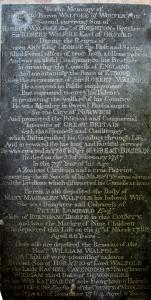
On 05 Feb 1818 Charles XIII King Sweden (age 69) died.
The Diary of George Price Boyce 1865. 05 Feb 1865. Called on Poynter (age 28) to see his competition drawings for the Old Water Colour Society. One of them, that with Ellen Smith with fan in her hand, very good. Called on Jopling.
Note.
On 15 Oct 1886 Captain Philip Hamond (age 72) died.
On 01 Feb 1914 his son Charles Annesley Hamond (age 29) died.
On 05 Feb 1917 Thomas Astley Horace Hamond (age 71) died.
Memorials in All Saints Church, West Acre [Map].
Captain Philip Hamond: Around 1814 he was born to Philip Hamond of High House in West Acre in Norfolk and Anne Packe.
Charles Annesley Hamond: On 08 Nov 1856 he was born to Captain Philip Hamond.
Thomas Astley Horace Hamond: On 17 Aug 1845 he was born to Anthony Hamond and Mary Anne Musters.
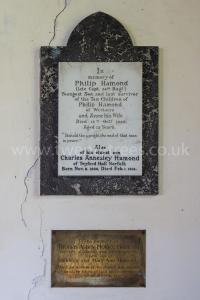
On 05 Feb 1889 James Smetham (age 67) died.
From 05 Feb 1900 to 07 Feb 1900. The Battle of Vaal Krantz was fought at Vaal Krantz, Natal between General Redvers Buller's British army and Louis Botha's army of Boer irregulars and lift the Siege of Ladysmith.
On 05 Feb 1900 Lieutenant Charles Duncombe Shafto (age 22) was killed in action whilst serving with the Durham Light Infantry on the first day of Battle of Vaal Krantz.
On 05 Feb 1919 Leon Joseph Chavalliaud (age 61) died in Boissy-sans-Avoir,Yvesline,Île-de-France, France.
After 05 Feb 1922. Church of the Holy Trinity Embleton [Map]. Memorial to Colonel William Robert Craster (age 85) and Mary Joanna Hincks.
Colonel William Robert Craster: On 26 Sep 1836 he was born to Thomas Wood aka Craster at Preston Tower. On 17 Jun 1868 Colonel William Robert Craster and Mary Joanna Hincks were married. On 05 Sep 1922 Colonel William Robert Craster died.
Mary Joanna Hincks: Around 1836 she was born to Thomas Cowper Hincks of Breckenbrough in Yorkshire. On 24 Jun 1908 she died at Beadnell Hall.
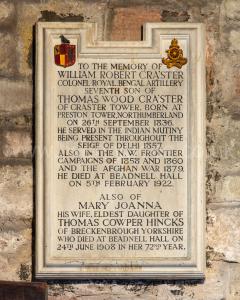
The Times. 05 Feb 1929. The funeral of the Earl of Durham (deceased) took place yesterday at Burnmoor. The Countess of Durham (age 69) who was unable to attend owing to illness, received the following telegram from the Queen (age 61):- "I send you and your family my sincere sympathy in your great sorrow.".
The cortege left Fenton [Map] at 11.30, and, as followed by 25 coaches, three of which conveyed wreaths. The chief mourners included Viscount Lambton (age 44) and Captain the Hon. Claud Lambton (age 45) (sons). Captain the Hon. D'Arcv Lambton (age 62), the Hon. George Lambton (age 68), and the Hon. Charles Lambton (age 71) (brothers). Viscount Cecil (brother-in-law), the Earl (age 56) and Countess of Ellesmnere (age 48) (son-in-law and daughter), the Earl of Home (son-in-law). The officiating clergy were the Rev. Ralph Watson. the Rev. A. J. Gadd, the rector. and the Rev, G. F. Eolme. Tenants from Lord Durham's Fenton Estate were the bearers. A memorial eervice for Lord Durham was held vesterday at St. Peter's. Eaton-square, the Rev. Austin Thompson officiating. Among those present were:- The Hon. Mrs. Charles Lambton. the Bon. Mrs. Claud Lambton, Air. D'Arcy [?]. the Earl and Countess of Pembroke. Colonel the Hon. George Herhert also represented the Dowager Countess of Pembroke. Mr Arthur Lambton, the Duke and Duchess of Abereorn the Dowager Marchioness of Lansdowne Alberta Marchioness of Blanford.
Births on the 5th February
On 05 Feb 1328 John Burgh was born.
On 05 Feb 1345 John I Count of Penthièvre was born to Charles "Saint" Chatillon Duke Brittany (age 26) and Joan "Lame" Capet Countess Penthièvre (age 26). He a great x 3 grandson of King Henry III of England.
On 05 Feb 1438 Philip "Landless" Savoy II Duke Savoy was born to Louis Savoy I Count Savoy (age 24) and Anne Cyprus Countess Savoy (age 19) at Thonon-les-Bains, Haute-Savoie.
On 05 Feb 1439 Margaret Bourbon was born to Charles Bourbon I Duke Bourbon (age 38) and Agnes Valois Duchess Bourbon (age 34). Coefficient of inbreeding 2.50%. 
On 05 Feb 1538 Henry Brooke was born to George Brooke 9th Baron Cobham (age 41) and Anne Braye Baroness Cobham (age 36).

On 05 Feb 1550 William Brereton 1st Baron Brereton was born to William Brereton (age 30) and Jane Warburton (age 22).
On 05 Feb 1594 Henry Winchcombe was born to Francis Winchcombe (age 34).
On 05 Feb 1615 Anna Elisabeth Oldenburg was born to Alexander Oldenburg I Duke Schleswig Holstein Sonderburg (age 42) and Dorothea Schwarzburg Duchess Schleswig Holstein Sonderburg (age 36).
On 05 Feb 1642 Elizabeth Barnard Baroness Chandos was born to Henry Barnard (age 24).
On 05 Feb 1650 Anne Jules 2nd Duke de Noailles was born.
On or before 05 Feb 1673 Halsewell Tynte was born to Halswell Tynte 1st Baronet (age 24) and Grace Fortescue Lady Tynte. He was baptised on 04 Mar 1683 at the
On or before 05 Feb 1680 Richard Child aka Tylney 1st Earl Tylney was born to Josiah Child (age 48) and Emma Barnard (age 34). He was baptised on 05 Feb 1680 at the Church of St Mary the Virgin Wanstead.
On 05 Feb 1687 Barbara Shirley was born to Robert Shirley 1st Earl Ferrers (age 36) and Elizabeth Washington Baroness Ferrers Chartley.
On 05 Feb 1732 William Amherst was born to Jeffrey Amherst (age 55) in Sevenoaks, Kent [Map].
On 05 Feb 1764 Augusta Carolina Maria Nassau Weilburg was born to Charles Christian Nassau Weilburg (age 29) and Carolina Orange Nassau (age 20) at The Hague. She a great granddaughter of King George II of Great Britain and Ireland.
On 05 Feb 1770 Walter Butler 1st Marquess Ormonde was born to John Butler 17th Earl Ormonde 11th Earl Ossory (age 29) and Frances Wandesford Countess Ormonde and Ossory (age 16).
On 05 Feb 1770 Alan Hyde Gardner 2nd Baron Gardner was born to Alan Gardner 1st Baron Gardner (age 27).
On 05 Feb 1778 William Jocelyn Palmer was born.
On 05 Feb 1788 Robert Peel was born.
On 05 Feb 1789 Admiral Thomas John Cochrane was born to Admiral Alexander Inglis Cochrane (age 30).
Before 05 Feb 1791 Maria Arabella St John was born to Frederick St John (age 25).
On 05 Feb 1791 Robert William St John was born to Frederick St John (age 25) and Mary Kerr (age 23).
On 05 Feb 1792 Henry Somerset 7th Duke Beaufort was born to Henry Charles Somerset 6th Duke Beaufort (age 25) and Charlotte Sophia Leveson-Gower Duchess Beaufort (age 21).
On 05 Feb 1794 Richard Carr Glyn was born to Colonel Thomas Glyn (age 37).
On 05 Feb 1795 Thomas Laurence Dundas 2nd Earl Zetland was born to Lawrence Dundas 1st Earl Zetland (age 28) and Harriet Hale Baroness Dundas (age 25) at Marylebone.
On 05 Feb 1801 Thomas Charles Hanbury-Tracy 2nd Baron Sudeley was born to Charles Hanbury-Tracy 1st Baron Sudeley (age 22) and Henrietta Susanna Tracy.
On 05 Feb 1808 Sidney Godolphin Osborne was born to Francis Osborne 1st Baron Godolphin (age 30) and Elizabeth Charlotte Eden Baroness Godolphin (age 28) at Stapleford.
On 05 Feb 1809 Mary Gertude Robinson was born to Thomas de Grey 2nd Earl de Grey (age 27).
On 05 Feb 1815 John Simeon 3rd Baronet was born to Richard Godin Simeon 2nd Baronet (age 30) and Louisa Edith Barrington.
On 05 Feb 1858 Margaret Ethel Gordon Baroness Harlech was born to Charles Gordon 10th Marquess Huntly (age 66) and Maria Antoinetta Pegus Marchioness Huntly (age 37).
On 05 Feb 1862 Thomas Fremantle 3rd Baron Cottesloe was born to Thomas Fremantle 2nd Baron Cottesloe (age 32) and Augusta Henrietta Scott Baroness Cottesloe.
On 05 Feb 1872 Major Ernest Wriothesley Denny was born to Thomas Anthony Denny (age 53) and Mary Jane Noel.

On 05 Feb 1887 Kitty Edith Blanche Ogilvy was born to David Ogilvy 11th Earl of Airlie (age 31) and Mabell Gore Countess Airlie (age 20).
On 05 Feb 1888 Helen Grosvenor was born to Hugh Lupus Grosvenor 1st Duke Westminster (age 62) and Katherine Cavendish Duchess Westminster (age 31).

On 05 Feb 1895 John Loder 2nd Baron Wakehurst was born.
On 05 Feb 1904 Frederick Charles Gordon-Lennox 9th Duke of Richmond and Lennox 4th Duke of Gordon was born to Charles Gordon-Lennox 8th Duke Richmond (age 33) and Hilda Madeline Brassey Duchess Richmond (age 31).

On 05 Feb 1929 Sidney Montagu 11th Duke of Manchester was born to Alexander Montagu 10th Duke of Manchester (age 26) and Nell Vere Stead Duchess Manchester (age 27).
On 05 Feb 1934 Richard Baker Wilbraham 8th Baronet was born to Randle John Baker Wilbraham 7th Baronet (age 27).
On 05 Feb 1976 William Child-Villiers 10th Earl of Jersey was born to George Child-Villiers Viscount Villiers (age 27).
Marriages on the 5th February
Before 05 Feb 1326 Ralph Cobham (age 50) and Mary Brewes Countess Norfolk (age 24) were married. The difference in their ages was 26 years. She a great x 3 granddaughter of King John "Lackland" of England. 

On 05 Feb 1344 Richard Fitzalan 10th Earl of Arundel 8th Earl of Surrey (age 38) and Eleanor Plantagenet Countess Arundel and Surrey (age 25) were married at Ditton Church, Stoke Poges. She by marriage Countess Arundel Sussex. She the daughter of Henry Plantagenet 3rd Earl of Leicester 3rd Earl Lancaster (age 63) and Maud Chaworth. He the son of Edmund Fitzalan 9th Earl of Arundel and Alice Warenne Countess Arundel. They were half third cousins. He a great x 5 grandson of King John "Lackland" of England. She a great granddaughter of King Henry III of England. 



On 05 Feb 1381 King Henry IV of England (age 13) and Mary Bohun (age 13) were married at Arundel Castle [Map]. She the daughter of Humphrey Bohun 7th Earl Hereford 6th Earl Essex 2nd Earl of Northampton and Joan Fitzalan Countess Essex, Hereford and Northampton (age 34). He the son of John of Gaunt 1st Duke Lancaster (age 40) and Blanche Plantagenet Duchess Lancaster. They were second cousins. He a grandson of King Edward III of England. She a great x 2 granddaughter of King Edward "Longshanks" I of England. 



Before 05 Feb 1403 Thomas Morley 6th Baron Marshal 5th Baron Morley (age 10) and Isabel Pole Baroness Marshal and Morley were married. She the daughter of Michael de la Pole 2nd Earl Suffolk (age 42) and Katherine Stafford Countess Suffolk (age 27). She a great x 4 granddaughter of King Edward "Longshanks" I of England. 

On 05 Feb 1442 Louis Bourbon (age 37) and Gabrielle La Tour were married. He the son of John Bourbon I Duke Bourbon and Marie Valois I Duchess Auverge. He a great x 5 grandson of King Henry III of England. 
On 05 Feb 1600 John Gordon 13th Earl Sutherland (age 24) and Agnes Elphinstone were married. The marriage was celebrated ovre two days at his lodgings Royal Mint aka Cunyiehous. King James VI of Scotland (age 33) and Queen Anne of Denmark (age 25) were house guests. As wedding gifts, James VI gave Agnes and Jean Elphinstone suites of gold and pearl accessories comprising, a necklace, a belt, and back and fore "garnishings" for their hair, which cost £1,333-6s-8d Scots. He the son of Alexander Gordon 12th Earl Sutherland.
On 05 Feb 1608 William Hervey 1st Baron Hervey (age 43) and Cordell Annesley were married.
Around 05 Feb 1695 Peter Hussey (age 28) and Margaret Evelyn (age 20) were married.
After 05 Feb 1696 John Carleton (age 54) and Susanna Acland (age 62) were married. She a great x 4 granddaughter of King Edward IV of England. 
On 05 Feb 1753 George Neville 1st Earl Abergavenny (age 25) and Henrietta Pelham Baroness Bergavenny (age 22) were married. She by marriage Baroness Bergavenny.
On 05 Feb 1768 George Manners-Sutton (age 44) and Mary Peart were married. He the son of John Manners 3rd Duke Rutland (age 71) and Bridget Sutton Duchess Rutland.

On 05 Feb 1784 Archbishop Edward Venables-Vernon-Harcourt (age 26) and Anne Leveson-Gower (age 23) were married. She the daughter of Granville Leveson-Gower 1st Marquess Stafford (age 62) and Louisa Egerton Countess Gower.

On 05 Feb 1810 William Duff-Gordon 2nd Baronet (age 37) and Caroline Cornewall Lady Duff-Gordon (age 21) were married. They had four children. She by marriage Lady Duff of Halkin in Aberdeenshire. He the son of Alexander Gordon and Anne Duff Countess Dumfries (age 72).
Before 05 Feb 1830 George Thomas Wyndham of Cromer Hall Norfolk (age 24) and Maria Augusta Windham Countess Listowel (age 25) were married.
On 05 Feb 1857 Alfred Spencer-Churchill (age 33) and Harriett Louisa Hester Gough (age 25) were married. He the son of George Spencer-Churchill 6th Duke of Marlborough (age 63) and Jane Stewart Duchess of Marlborough. They were third cousins.

On 05 Feb 1879 Francis Salwey Winnington 5th Baronet (age 29) and Jane Spencer-Churchill Lady Winnington (age 21) were married. She by marriage Lady Winnington of Stanford Court in Worcestershire.
On 05 Feb 1904 Henry Fitzalan Howard 15th Duke of Norfolk (age 56) and Gwendolen Constable-Maxwell Duchess Norfolk (age 27) were married. She by marriage Duchess Norfolk. The difference in their ages was 29 years. He the son of Henry Granville Fitzalan 14th Duke of Norfolk and Augusta Mary Minna Catherine Lyons Duchess Norfolk. They were first cousin once removed.
On 05 Feb 1916 Wilhelm Friedrich Christian Glücksburg Duke Schleswig Holstein Sonderburg Glücksburg (age 24) and Marie Melita Hohenlohe Langenburg Duchess Schleswig Holstein Sonderburg Glücksburg (age 17) were married. He the son of Friedrich Ferdinand Glücksburg Duke Schleswig Holstein Sonderburg Glücksburg (age 60) and Victoria Friederike Oldenburg Duchess Schleswig Holstein Sonderburg Glücksburg (age 56). He a great x 4 grandson of King George II of Great Britain and Ireland. She a great granddaughter of Queen Victoria of the United Kingdom. 
On 05 Feb 1942 William Stanhope 11th Earl of Harrington (age 19) and Eileen Foley Grey Countess Harrington (age 20) were married. She by marriage Countess Harrington. He the son of Charles Stanhope 10th Earl of Harrington.
On 05 Feb 1975 James Fergus Surtees Graham 7th Baronet (age 28) and Serena Jane Kershaw were married.
Deaths on the 5th February
On 05 Feb 1171 Robert Fitzharding 1st Baron Berkeley (age 75) died at Bristol, Gloucestershire [Map]. His son Maurice Fitzharding aka Berkeley 2nd Baron Berkeley (age 51) succeeded 2nd Baron Berkeley Feudal. Alice Berkeley Baroness Berkeley (age 36) by marriage Baroness Berkeley Feudal.
On 05 Feb 1228 Sybil de Braose Countess Derby (age 71) died.
On 05 Feb 1326 Ralph Cobham (age 50) died.
On 04 Feb 1400 Bernard Brocas (age 46) was tried, and condemned to death, by Thomas Fitzalan 10th Earl of Surrey 12th Earl of Arundel (age 18) at Tower of London [Map] for his role in the Epiphany Rising having been captured in Cirencester, Gloucestershire [Map].
On 05 Feb 1400 Bernard Brocas (age 46) was beheaded at Tyburn [Map]. He was buried at the Chapel of St Edmund, Westminster Abbey [Map].
On 05 Feb 1430 Edmund Fitzwilliam (age 60) died.
On 05 Feb 1465 Elizabeth Boteler (age 79) died.
On 05 Feb 1489 Richard Verney (age 86) died.
On 05 Feb 1535 Janet Mathew (age 80) died in Picton.
On 05 Feb 1548 Alexander Radclyffe of Ordsall (age 75) died.
On 05 Feb 1563 Thomas Arden (age 86) died.
On 05 Feb 1598 Alvery Copley (age 72) died.
On 05 Feb 1605 Edward Stafford (age 53) died. He was buried at St Margaret's Church, Westminster [Map].
Before 05 Feb 1607 Mary Browne Countess Southampton (age 54) died.
On 05 Feb 1627 John Stansfield (age 60) died.
On 05 Feb 1628 Robert Meverell died.
On 05 Feb 1638 John Bridgeman died.
On 05 Feb 1639 Augusta Oldenburg (age 58) died.
On or before 05 Feb 1651 George Gresley 1st Baronet (age 71) died. He was buried on 05 Feb 1651 at Temple Church, London [Map]. His grandson Thomas Gresley 2nd Baronet (age 23) succeeded 2nd Baronet Gresley of Drakelow in Derbyshire. Frances Morewood Lady Gresley (age 20) by marriage Lady Gresley of Drakelow in Derbyshire.
On or before 05 Feb 1662, the date of his burial at St James' Church, Clerkenwell, Daniel Hollingworth of St James', Clerkenwell died.
Before 08 Oct 1666 Alderman Francis Meynell died. His will was proved 05 Feb 1683. His will includes:
On 05 Feb 1672 Bishop William Nicholson (age 80) died.
Between 13 Oct 1673 and 05 Feb 1674 James Darcy (age 56) died. He was baptised on 30 Nov 1617.
On 05 Feb 1676 Thomas Trevor 1st Baronet (age 64) died. Baronet Trevor of Enfield in Middlesex extinct. His estates passed to Charles Wheler 2nd Baronet (age 56), grandson of his father's sister Mary aka Winifred Trevor.
On 05 Feb 1680 Edward Phelips (age 67) died. He was buried at Church of St Catherine, Montacute [Map].
On 05 Feb 1680 Francis Clinton (age 67) died.
On 05 Feb 1683 Thomas Vernon 2nd Baronet (age 6) died. His son Richard Vernon 3rd Baronet succeeded 3rd Baronet Vernon of Hodnet in Shropshire.
On 05 Feb 1684 Dorothy Sidney Countess Sunderland (age 66) died.
On 05 Feb 1684 Thomas Myddelton 2nd Baronet (age 33) died. His brother Richard Myddelton 3rd Baronet (age 28) succeeded 3rd Baronet Myddelton of Chirk Castle.
On 05 Feb 1685 Norton Knatchbull 1st Baronet died. His son John Knatchbull 2nd Baronet (age 49) succeeded 2nd Baronet Knatchbull of Mersham Hatch in Kent. Jane Monins Lady Knatchbull by marriage Lady Knatchbull of Mersham Hatch in Kent.
On 05 Feb 1695 Donald Macdonald 10th of Sleat 3rd Baronet died.
On 05 Feb 1696 Edward Halsall (age 62) died.
On 05 Feb 1697 Susanna Acland (age 63) died.
On 05 Feb 1709 Thomas Fountayne (age 70) died.
Around 05 Feb 1717 Folliot Wingfield 1st Viscount Powerscourt (age 74) died. Viscount Powerscourt extinct.
On 05 Feb 1717 Lucy Loftus Marchioness Wharton (age 47) died.
On 05 Feb 1721 James Stanhope 1st Earl Stanhope (age 48) died. His son Philip Stanhope 2nd Earl Stanhope (age 6) succeeded 2nd Earl Stanhope.
On 05 Feb 1721 Abraham Hill (age 87) died.
On 05 Feb 1723 Mary Page died.
On 05 Feb 1724 Mary Clavering Countess Cowper (age 39) died.
On 05 Feb 1728 Henriette Albertine Saxe Coburg Saalfeld (age 29) died at Coburg.
On 05 Feb 1731 John Cotton 4th Baronet (age 51) died. His uncle Robert Bruce Cotton 5th Baronet (age 53) succeeded 5th Baronet Cotton of Conington in Huntingdonshire.
On 05 Feb 1757 Horatio Walpole 1st Baron Walpole (age 78) died at Wickmere, Norfolk. His son Horatio Walpole 1st Earl Orford (age 33) succeeded 2nd Baron Walpole of Wollerton.
On 05 Feb 1759 Lucy Smith died.
On 05 Feb 1773 Lawrence Rowland Ferrers Shirley (age 16) died.
On 05 Feb 1776 Fredericka Louise Saxe Coburg Altenburg (age 35) died.
On 05 Feb 1782 Mary Moreton died.
On 05 Feb 1792 John Eardley-Wilmot (age 82) died.
On 05 Feb 1793 Robert Murray (age 7) died.
On 05 Feb 1795 John Duntze 1st Baronet (age 61) died. His son John Duntze 2nd Baronet (age 33) succeeded 2nd Baronet Duntze of Tiverton in Devon.
On 05 Feb 1800 Louisa Bridget Manners-Sutton died.
On 05 Feb 1806 Christopher Willoughby 1st Baronet (age 57) died. His son Christopher Willoughby 2nd Baronet (age 13) succeeded 2nd Baronet Willoughby of Baldon House in Oxfordshire.
On 05 Feb 1811 Henrietta Hunloke (age 27) died.
On 05 Feb 1818 Charles XIII King Sweden (age 69) died.
On 05 Feb 1830 Henry Seymour-Conway (age 83) died.
On 05 Feb 1830 George Thomas Wyndham of Cromer Hall Norfolk (age 24) died.
On 05 Feb 1830 Susan Mordaunt Countess St Germans (age 50) died.
On 05 Feb 1833 John Marjoribanks 1st Baronet (age 70) died.
On 05 Feb 1834 Frances Shirley (age 51) died.
On 05 Feb 1840 Mary Bermingham died.
On 05 Feb 1850 Catherine Maria Johnson (age 64) died.
On 05 Feb 1856 Bishop Hugh Percy (age 72) died.
On 05 Feb 1860 Margarette Willes Baroness Leigh (age 61) died.
On 05 Feb 1870 Pamela Blanche Rushout (age 30) died.
On 05 Feb 1875 Thomas Carpendale Baird (age 45) died.
On 15 Oct 1886 Captain Philip Hamond (age 72) died.
On 01 Feb 1914 his son Charles Annesley Hamond (age 29) died.
On 05 Feb 1917 Thomas Astley Horace Hamond (age 71) died.
Memorials in All Saints Church, West Acre [Map].
Captain Philip Hamond: Around 1814 he was born to Philip Hamond of High House in West Acre in Norfolk and Anne Packe.
Charles Annesley Hamond: On 08 Nov 1856 he was born to Captain Philip Hamond.
Thomas Astley Horace Hamond: On 17 Aug 1845 he was born to Anthony Hamond and Mary Anne Musters.

On 05 Feb 1887 Louisa Harriet Jenkinson (age 72) died.
On 05 Feb 1889 James Smetham (age 67) died.
On 05 Feb 1889 Laura Emma Milner died.
On 05 Feb 1889 Henry Howard 2nd Earl of Effingham (age 82) died. His son Henry Howard 3rd Earl of Effingham (age 51) succeeded 3rd Earl of Effingham, 13th Baron Howard of Effingham.
On 05 Feb 1890 Antoine Orléans Duke Montpensier (age 65) died.
On 05 Feb 1900 Lieutenant Charles Duncombe Shafto (age 22) was killed in action whilst serving with the Durham Light Infantry on the first day of Battle of Vaal Krantz.
On 05 Feb 1903 Louisa Caroline Stewart Baroness Ashburton (age 75) died.
On 05 Feb 1911 Amalia Mary Maud Cassel (age 31) died of tuberculosis. She was buried at Romsey Abbey [Map].
On 05 Feb 1918 Margaret Elizabeth Montagu-Douglas-Scott (age 71) died.
On 05 Feb 1919 Leon Joseph Chavalliaud (age 61) died in Boissy-sans-Avoir,Yvesline,Île-de-France, France.
On 05 Feb 1919 William Michael Rossetti (age 89) died. He was buried in the Rossetti Family Grave.
On 05 Feb 1921 Francis Martineau Lupton (age 72) died.
On 05 Feb 1921 Katherine Wood (age 75) died.
On 05 Feb 1922 Frances Dora Smith Countess Strathmore and Kinghorne (age 89) died.
On 05 Feb 1933 Major John Clive Darling (age 45) died.
On 05 Feb 1939 Francis Edmund George Astley-Corbett 4th Baronet (age 79) died. His grandson Francis Henry Rivers Astley-Corbett 5th Baronet (age 24) succeeded 5th Baronet Astley of Everleigh in Wiltshire.
On 05 Feb 1940 Francis Douglas Blake 1st Baronet (age 83) died. His son Francis Edward Colquhoun Blake 2nd Baronet (age 46) succeeded 2nd Baronet Blake of Tillmouth Park in Cornhill in Northumberland.
On 05 Feb 1942 Rosamund Catherine Petre Countess Bantry (age 84) died.
On 05 Feb 1955 Cicely Anne Gore Marchioness Salisbury (age 87) died.
On 05 Feb 1959 Muriel Dorey Lady Fitzherbert died.
On 05 Feb 1984 Henry Hugh Arthur Fitzroy Somerset 10th Duke Beaufort (age 83) died at Badminton House without issue. He was buried at St Michael and all Angels Church, Badminton. His first cousin twice removed David Fitzroy 11th Duke Beaufort (age 55) succeeded 11th Duke Beaufort, 13th Marquess Worcester, 17th Earl Worcester. Baron Botetort abeyant. Caroline Jane Thynne 11th Duchess Beaufort (age 56) by marriage Duchess Beaufort.

On 05 Feb 1997 Pamela Digby (age 76) died.